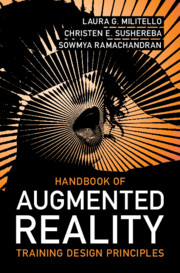Book contents
- Handbook of Augmented Reality Training Design Principles
- Handbook of Augmented Reality Training Design Principles
- Copyright page
- Dedication
- Contents
- Figures
- Tables
- Preface
- Acknowledgments
- Chapter 1 Introduction
- Chapter 2 Recognition Skills
- Chapter 3 Engagement
- Chapter 4 Scenario Building
- Chapter 5 Fidelity and Realism
- Chapter 6 Supporting Mental Model Construction
- Chapter 7 Scaffolding and Reflection
- Chapter 8 Synthesis
- Chapter 9 Conclusion
- References
- Index
Chapter 4 - Scenario Building
Published online by Cambridge University Press: 18 May 2023
- Handbook of Augmented Reality Training Design Principles
- Handbook of Augmented Reality Training Design Principles
- Copyright page
- Dedication
- Contents
- Figures
- Tables
- Preface
- Acknowledgments
- Chapter 1 Introduction
- Chapter 2 Recognition Skills
- Chapter 3 Engagement
- Chapter 4 Scenario Building
- Chapter 5 Fidelity and Realism
- Chapter 6 Supporting Mental Model Construction
- Chapter 7 Scaffolding and Reflection
- Chapter 8 Synthesis
- Chapter 9 Conclusion
- References
- Index
Summary
Building scenarios for training recognition skills in complex domains requires the addition of hard-to-detect cues and unexpected events. This chapter describes the Periphery Principle, which emphasizes the importance of including critical cues in nonobvious ways so trainees learn how to seek them, and the Perturbation Principle, which encourages training designers to incorporate unexpected events into training scenarios so trainees learn to adapt to novel situations. The chapter presents methods for identifying peripheral cues and important perturbations for a particular domain or task, and gives examples of critical cue inventories and complexity tables that can be useful tools for training designers.
Keywords
- Type
- Chapter
- Information
- Handbook of Augmented Reality Training Design Principles , pp. 34 - 49Publisher: Cambridge University PressPrint publication year: 2023

